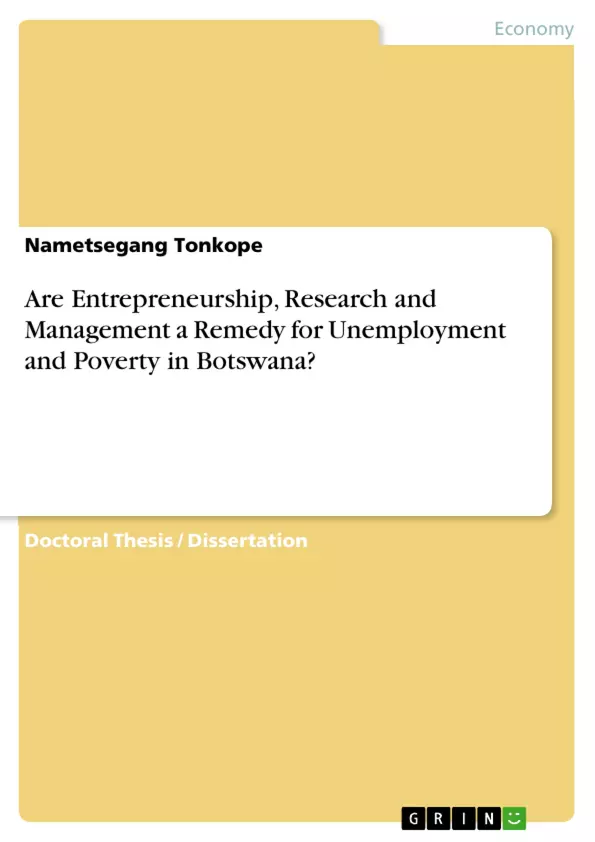
Are Entrepreneurship, Research and Management a Remedy for Unemployment and Poverty in Botswana?
Doktorarbeit / Dissertation, 2018
127 Seiten, Note: 4,00
Leseprobe
Inhaltsverzeichnis (Table of Contents)
- Introduction
- Literature Review
- Entrepreneurship
- Research and Business Management
- Entrepreneurship, Research and Business Management as a Remedy for Unemployment and Poverty Reduction
- Methodology
- Research Design
- Population and Sample
- Data Collection and Analysis
- Findings and Discussion
- Perception of Graduates on Entrepreneurship, Research and Business Management
- Factors Influencing Graduates' Decision to Venture into Entrepreneurship
- Challenges Faced by Graduates in Starting Businesses
- Recommendations
- Conclusion
Zielsetzung und Themenschwerpunkte (Objectives and Key Themes)
This dissertation investigates the perception of graduates in Botswana regarding the introduction of entrepreneurship, research, and business management (ERBM) programmes as a potential solution to unemployment and poverty reduction. The research aims to assess the potential impact of such a programme on graduates' entrepreneurial engagement, ultimately contributing to economic growth and social development in Botswana.
- The role of entrepreneurship, research, and business management in addressing unemployment and poverty.
- The perception of graduates towards ERBM programmes as a potential solution to unemployment and poverty.
- The factors influencing graduates' decisions to venture into entrepreneurial activities.
- The challenges faced by graduates in starting and managing businesses.
- The potential benefits of introducing ERBM programmes in public tertiary institutions in Botswana.
Zusammenfassung der Kapitel (Chapter Summaries)
The introduction provides an overview of the research problem, highlighting the challenges of graduate unemployment and poverty in Botswana. It sets the stage for the subsequent chapters, outlining the objectives and methodology of the study. The literature review delves into the concepts of entrepreneurship, research, and business management, exploring their relationship with unemployment and poverty reduction. It also examines existing research on the impact of ERBM programmes in other countries.
The methodology chapter details the research design, sampling procedures, data collection methods, and analysis techniques employed in the study. The findings and discussion chapter presents the results of the study, focusing on graduates' perceptions of ERBM programmes, the factors influencing their entrepreneurial intentions, and the challenges they face in starting businesses. The recommendations chapter proposes strategies for improving the effectiveness of ERBM programmes in Botswana.
Schlüsselwörter (Keywords)
The key focus areas of this dissertation are entrepreneurship, research, business management, graduate unemployment, poverty reduction, job creation, and education. The study explores the potential of integrating ERBM programmes into public tertiary institutions in Botswana to address these challenges and promote economic growth.
Frequently Asked Questions
What is the main focus of this study regarding Botswana?
The study investigates whether standalone programmes in entrepreneurship, research, and business management (ERBM) can serve as remedies for unemployment and poverty in Botswana.
Why is graduate unemployment a critical issue in Botswana?
Large numbers of graduates are produced annually with few job opportunities, leading to poverty, social instability, and other socio-economic challenges.
What are the potential benefits of ERBM programmes for graduates?
These programmes aim to equip learners with specific skills needed to start their own businesses and foster innovation, rather than just teaching entrepreneurship as a minor unit.
What challenges do graduates face when starting a business in Botswana?
The research explores various hurdles, including lack of relevant training, financial constraints, and the need for better business management education.
Who is the target audience for the proposed postgraduate entrepreneurship programme?
The programme targets graduates and individuals interested in entrepreneurship who want to acquire advanced skills to create jobs and contribute to a knowledge-based economy.
What methodology was used in this dissertation?
The study uses a research design involving population sampling and data analysis to assess graduates' perceptions of entrepreneurship education.
Details
- Titel
- Are Entrepreneurship, Research and Management a Remedy for Unemployment and Poverty in Botswana?
- Hochschule
- ( Atlantic International University ) (Atlantic International University)
- Veranstaltung
- Business and Economics
- Note
- 4,00
- Autor
- Nametsegang Tonkope (Autor:in)
- Erscheinungsjahr
- 2018
- Seiten
- 127
- Katalognummer
- V458237
- ISBN (eBook)
- 9783668929838
- ISBN (Buch)
- 9783668929845
- Sprache
- Englisch
- Schlagworte
- entrepreneurship research management remedy unemployment poverty botswana
- Produktsicherheit
- GRIN Publishing GmbH
- Preis (Ebook)
- US$ 39,99
- Preis (Book)
- US$ 50,99
- Arbeit zitieren
- Nametsegang Tonkope (Autor:in), 2018, Are Entrepreneurship, Research and Management a Remedy for Unemployment and Poverty in Botswana?, München, Page::Imprint:: GRINVerlagOHG, https://www.diplomarbeiten24.de/document/458237
- Autor werden
- Ihre Optionen
- Vertriebskanäle
- Premium Services
- Autorenprofil
- Textarten und Formate
- Services für Verlage, Hochschulen, Unternehmen

- © GRIN Publishing GmbH.
- Alle Inhalte urheberrechtlich geschützt. Kopieren und verbreiten untersagt.
- info@grin.com
- AGB
- Open Publishing
Der GRIN Verlag hat sich seit 1998 auf die Veröffentlichung akademischer eBooks und Bücher spezialisiert. Der GRIN Verlag steht damit als erstes Unternehmen für User Generated Quality Content. Die Verlagsseiten GRIN.com, Hausarbeiten.de und Diplomarbeiten24 bieten für Hochschullehrer, Absolventen und Studenten die ideale Plattform, wissenschaftliche Texte wie Hausarbeiten, Referate, Bachelorarbeiten, Masterarbeiten, Diplomarbeiten, Dissertationen und wissenschaftliche Aufsätze einem breiten Publikum zu präsentieren.
Kostenfreie Veröffentlichung: Hausarbeit, Bachelorarbeit, Diplomarbeit, Dissertation, Masterarbeit, Interpretation oder Referat jetzt veröffentlichen!
- GRIN Verlag GmbH
-
- Nymphenburger Str. 86
- 80636
- Munich, Deutschland
- +49 89-550559-0
- +49 89-550559-10
- info@grin.com
-









